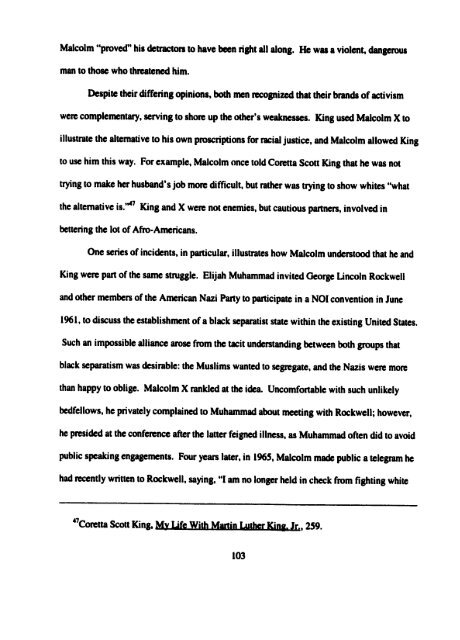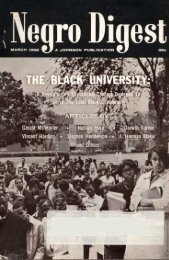- Page 1 and 2:
CCVII. RIGHTS & SELF-DEFENSE : THE
- Page 3 and 4:
Civil Rights and Self-Defense : The
- Page 5 and 6:
It was not until the 1950's and 196
- Page 7 and 8:
ights movement, including : redempt
- Page 9 and 10:
unnoticed, unbeknownst, or simply i
- Page 11 and 12:
nonviolence . It is not a complete
- Page 13 and 14:
happen, and the time for defense is
- Page 15 and 16:
during this period currently lie do
- Page 17 and 18:
what is right, but Iam not sure how
- Page 19 and 20:
could be argued that King's middle-
- Page 21 and 22:
people customarily initiated it . F
- Page 23 and 24:
"The Other Cheek" : ReUn9ubhing Sel
- Page 25 and 26:
expressed an urge to "give as good
- Page 27 and 28:
professionals and faculty members f
- Page 29 and 30:
But while King defused the volatile
- Page 31 and 32:
(FOR), and William Worthy, a black
- Page 33 and 34:
practicability of his position: '~4
- Page 35 and 36:
Additionally, Bayard Rustin reporte
- Page 37 and 38:
the power structure."~ In other wor
- Page 39 and 40:
available to the Negro in his strug
- Page 41 and 42:
(toughmindedness) and love (tenderh
- Page 43 and 44:
compelling arguments for the moral
- Page 45 and 46:
and faggot. For example, in 1889, J
- Page 47 and 48:
His first impulse when threatened w
- Page 49 and 50:
aggravate ; that is, his politics o
- Page 51 and 52:
quantitative change in our lives."
- Page 53 and 54:
'~P~opk With StrenSth": Questioning
- Page 55 and 56:
united behind him:'s Comparing his
- Page 57 and 58:
paratroopers from the 101" Airborne
- Page 59 and 60:
Williams respected what he called "
- Page 61 and 62:
NAACP had always appealed, he scour
- Page 63 and 64:
Montgomery was buried without incid
- Page 65 and 66:
motorcade with gunfiro when the car
- Page 67 and 68:
slavery and oppression . Tire Negro
- Page 69 and 70:
S-6 . at the heart of his nonviolen
- Page 71 and 72:
act : anyone who would utilize nonv
- Page 73 and 74: folkways . Because they believed th
- Page 75 and 76: the South, found themselves spearhe
- Page 77 and 78: Brown ." sa That same month, Willia
- Page 79 and 80: pumping hundrr~ds of thousands of d
- Page 81 and 82: making better men either of themsel
- Page 83 and 84: He likened racism to a disease, a m
- Page 85 and 86: escalated . Rioting broke out. Then
- Page 87 and 88: Williams' ideas came to fruition in
- Page 89 and 90: When juxtaposed with the ideas of M
- Page 91 and 92: But if Willisms "made just as much
- Page 93 and 94: Whatever his place in prevailing hi
- Page 95 and 96: thinking merit special attention by
- Page 97 and 98: The women propared food, and served
- Page 99 and 100: candidate for county representative
- Page 101 and 102: tide of nonviolent diroct action ;
- Page 103 and 104: the sheriff again and told him that
- Page 105 and 106: characterized by hatred or meanness
- Page 107 and 108: terms of "`violence' versus `nonvio
- Page 109 and 110: than as separate entities, seenKd q
- Page 111 and 112: The best descriptor of Malcolm X wa
- Page 113 and 114: qualities in themselves. Finally, a
- Page 115 and 116: someone is treating you in a crimin
- Page 117 and 118: "You can't take a black man who is
- Page 119 and 120: attacked . Now, fve never been the
- Page 121 and 122: have, he wondered, to stop the loca
- Page 123: precluded him from being involved.
- Page 127 and 128: Malcolm reveled in ambivalence, and
- Page 129 and 130: While his views on integration, whi
- Page 131 and 132: He summed up his speoch by doclarin
- Page 133 and 134: journalist, labeled them "the South
- Page 135 and 136: shifted from Jonesbom to 8ogalusa,
- Page 137 and 138: cost. The struggle for black equali
- Page 139 and 140: point, the Deacons had ban quietly
- Page 141 and 142: Under the aegis of their charter an
- Page 143 and 144: them ; they were attuned to the law
- Page 145 and 146: the head, causing a gash . Leneva T
- Page 147 and 148: One thing is apparent in this year
- Page 149 and 150: mistake" ; the presence of the Deac
- Page 151 and 152: done:' Sims said, "we walked like m
- Page 153 and 154: he waa killedj, but I believe he wa
- Page 155 and 156: Events picked up across the border
- Page 157 and 158: they were bound to precipitate a ca
- Page 159 and 160: goals of the movement. A year later
- Page 161 and 162: Sellers noted that while King was f
- Page 163 and 164: things," he said. "Everybody want t
- Page 165 and 166: the group . For example, an intervi
- Page 167 and 168: "Understand, the Deacons don't repl
- Page 169 and 170: quest for black equality, and chang
- Page 171 and 172: self-defense denotation from the of
- Page 173 and 174: Lowndes County lies in the heart of
- Page 175 and 176:
"take over the courthouse" with sub
- Page 177 and 178:
On Monday, November 7,1966, the nig
- Page 179 and 180:
do anything violent ."~s But as the
- Page 181 and 182:
To Carmichael, the Deacons for Defe
- Page 183 and 184:
their perception in the media, and
- Page 185 and 186:
considered the Panthers "a living t
- Page 187 and 188:
legislator from Piedmont, specifica
- Page 189 and 190:
Seale, the police were the enforcem
- Page 191 and 192:
They also displayed a propensity to
- Page 193 and 194:
Newton viewed violence as not simpl
- Page 195 and 196:
Williams, a Panther. "We'd read Nat
- Page 197 and 198:
Newton, Seale, and Cleaver had all
- Page 199 and 200:
Simultaneously, they shouldered the
- Page 201 and 202:
The Deacons for Defense and Justice
- Page 203 and 204:
"The army turned on itself . . . Th
- Page 205 and 206:
defense. He believed that no ruling
- Page 207 and 208:
formulating their own . Coincidenta
- Page 209 and 210:
exposed the actions of some policem
- Page 211 and 212:
think in terms of armed conflict."~
- Page 213 and 214:
and his band waylaid the Cleveland
- Page 215 and 216:
Epilog : TIK Only Tis+sd T1Ky Was "
- Page 217 and 218:
action did so through a redefinitio
- Page 219 and 220:
with police personnel who were ofte
- Page 221 and 222:
lacks in West Feliciana Parish, Lou
- Page 223 and 224:
evolutionary war in tenors of self-
- Page 225 and 226:
everywhere a person goes, even insi
- Page 227 and 228:
epresented a quantum leap in the ab
- Page 229 and 230:
people carried themselves in public
- Page 231 and 232:
There can be an exaggerated distast
- Page 233 and 234:
demand. It never did and it never w
- Page 235 and 236:
"anti-American diatribes of the ran
- Page 237 and 238:
allowed both RAM and the RNA to use
- Page 239 and 240:
United States was having." s~ Exasp
- Page 241 and 242:
hammering home the notions of self-
- Page 243 and 244:
to you, that did more good than non
- Page 245 and 246:
SELECTED BIBLIOGRAPHY ~~un~~r~ws a~
- Page 247 and 248:
W"C~"Y//iO~ ~JYL7///~O{i California
- Page 249 and 250:
Knight, Jack C. "Reckoning with Vio
- Page 251 and 252:
Belknap, Michael R. Feral Law and S
- Page 253 and 254:
Crcnshaw, Kimberlie. Critical Race
- Page 255 and 256:
Grant, Joanne . Hlack Pnxsst : Iist
- Page 257 and 258:
McCord, William, John Howard, Berna
- Page 259 and 260:
Reddick, Lawt+ence D. Crusader With
- Page 261 and 262:
Wilkins, Roy and Ramsey Clark . Sea
- Page 263:
The Road from Mont~p~. WCBS-TV. New
















